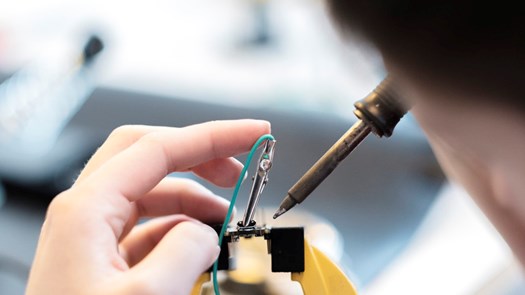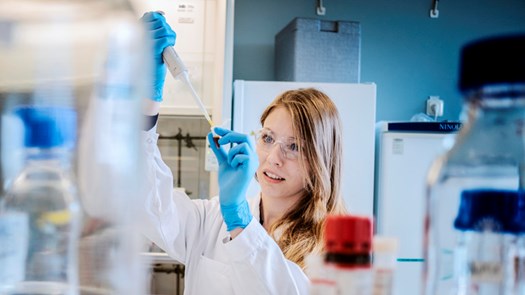Cookie information
PhD Studies
If you would like to continue your studies beyond your master’s degree, it is possible to progress to doctoral studies. A PhD programme corresponds to four years of full-time study (240 HE credits) and ends with a doctoral degree. After two years of study (120 HE credits), a licentiate degree can be awarded.
How to become a PhD student
To be admitted to PhD studies, you must first apply for, and be granted, a vacant employed PhD position at the University. All international PhD positions will be posted in English.
Financing
A majority of PhD students in Sweden are employed by their university. This means that you get a salary as well as paid vacation leave, and the right to paid parental leave.
There are no admission or tuition fees if you are admitted as a PhD through Malmö University. Alternative financing (if you are not employed) for PhD studies will only be accepted in special circumstances.
Entry requirements
In order to be admitted as a doctoral student at Malmö University you must meet the general entry requirements. There may also be specific entry requirements for each subject. The general and specific entry requirements are essential for you to be able to benefit from the course or study programme.
These requirements may comprise knowledge from higher education courses and study programmes. You could also be required to have specific language skills. The specific entry requirements are listed in the general sullabus for each subject. If you apply for a vacant position, the general and specific entry requirements are listed in the advertisment.
Admission regulations
Information about entry requirements and how to write your application is provided in the advertisment for the vacant position.
The admission regulations are detailed in the document below.
Admission regulations for third-cycle studies
General entry requirements for all doctoral education
Higher Education Ordinance, Chapter 7, Section 39
A potential candidate meets the general entry requirements for third-cycle courses and study programmes if they:
- have been awarded a second-cycle qualification
- have satisfied the requirements for courses comprising at least 240 credits of which at least 60 credits were awarded in the second-cycle, or:
- have acquired substantially equivalent knowledge in some other way in Sweden or elsewhere.
The higher education institution may permit an exemption from the general entry requirements for an individual applicant, if there are special grounds.
PhD subjects
Malmö University awards degrees in 16 doctoral education subjects, with five faculties being responsible for the doctoral programmes. The syllabus and entry requirements are laid down in the general study plan for each subject.
Our PhD subjects
Biomedical Science
Biomedical Science is a multidisciplinary subject, drawing on chemistry, physics, human biology and medicine. Within biomedical science, theoretical and applied science is combined to provide applications in areas such as medical diagnosis and treatment.
The subject also involves taking into account relevant academic, societal and ethical deliberations based on an holistic view of the human being.
General syllabus for Biomedical Science
Care Science
The subject field of caring science is multi-disciplinary and multi-professional. It encompasses theories and methods for studying problems, processes, factors, and interventions related to physical and mental ill-health.
One area of caring science is nursing, which encompasses prevention, support, caring, and rehabilitation in health services and patient care in different environments and contexts.
General syllabus for Care Science
Computer Science
Computer Science is the analysis and development of concepts, methods and tools aimed at making the development and use of digital systems easy, reliable and efficient.
General syllabus for Computer Science
Global Politics
The study of Global Politics is multidisciplinary and incorporates approaches both from the social sciences and the humanities. Transnational and international forms of politics, both in terms of continuity and change, cooperation and conflict, power and contestation, constitute the core of the subject.
General syllabus for Global Politics
Health and Society
Health and Society is a multidisciplinary research discipline focussing on human health and well-being by applying a medical and social science perspective to analyses of the interplay between individuals and social processes.
General syllabus for Health and Society
History and History Didactics
General syllabus for History and History Didactics (swedish)
Interaction Design
Interaction Design is a subject within the design sciences that explores how designed systems, processes, artefacts can shape our world. This programme cultivates both practical and theoretical expertise, with an emphasis on integrating design practices with critical reflection.
General syllabus for Interaction Design
International Migration and Ethnic Relations (IMER)
The subject IMER is a broad research topic with a multi and interdisciplinary basis. It's about the consequences of migration for both the society of origin and destination at different levels, on the structural, institutional, group and individual level, and how ethnic relations and ethnic diversity become important characteristics for society due to, or as a result of, migration.
Central adjoining areas of research relate to citizenship, belonging, diaspora and identity, as well as unwanted processes such as marginalisation, exclusion and alienation.
General syllabus for International Migration and Ethnic Relations (IMER)
Language and Literature Didactics
General syllabus for Language and Litterature Didactics (swedish)
Media and Communication Studies
Media and Communication Studies focusses on the significance of media for culture and society, and for human thinking and everyday life. This is achieved from both historical and contemporary perspectives. The subject includes traditional mass media as well as digital media.
General syllabus for Media and Communication Studies
Odontology
The doctoral education is intended to advance knowledge and skills within the field of oral health in the following departments:
- cariology
- endodontics
- oral and maxillofacial radiology
- odontological technology
- oral biology
- oral diagnostics
- oral surgery and oral medicine
- oral pathology
- oral prosthetics
- orofacial pain and jaw function
- orthodontics
- periodontology with oral public health or pedodontics
General syllabus for Odontology (swedish)
Pedagogy
General syllabus for Pedagogy (swedish)
Science and Mathematics Education
General syllabus for Science and Mathematics Education (Swedish)
Social Work
Social Work is a study of individuals and groups in vulnerable life situations and of social conditions which affect people’s living conditions.
The studies take their point of departure in social problems, but also include factors and strategies that prevent and counteract social marginalisation and exclusion. Social work also comprises studies of the social interventions and of the human service organisations which provide such interventions.
General syllabus for Social Work
Sports Science
General syllabus for Sports Science (Swedish only)
Urban Studies
Urban Studies is the scientific study of the content, form, planning and transformation of urban areas. The subject is positioned in a field of tension between social and cultural practices and the material world of manufactured landscapes, buildings, infrastructure and everyday objects.
PhD courses
In addition to the actual doctoral thesis, the PhD study programme also includes one component course. The content of this course is governed by the general syllabus for the PhD subject area. The specific courses that should be included in the study programme will be decided upon in consultation with the supervisors.
GlycoImaging
GlycoImaging
GlycoImaging is a European Training Network (ETN) funded by the European Commission under the Horizon 2020 Marie Skłodowska-Curie Action, with the aim of developing the next generation tools for cancer research and diagnostics.
Data-driven Systems

Data-driven Systems
The evolution of IoT has largely been driven by developments in technology. Computing power and connectivity are becoming smaller, cheaper and more energy efficient, thus making it possible to connect and augment an increasing range of objects.
BioCapture

BioCapture
BioCapture is a European Training Network (ETN) funded by the European Commission under the Horizon 2020 Marie Skłodowska-Curie Action, with the aim of developing the next generation tools for cancer research and diagnostics.
Information for admitted doctoral student
You can find more information about dissertations, doctoral support, upcoming workshops, and other relevant details on our Staff website.
